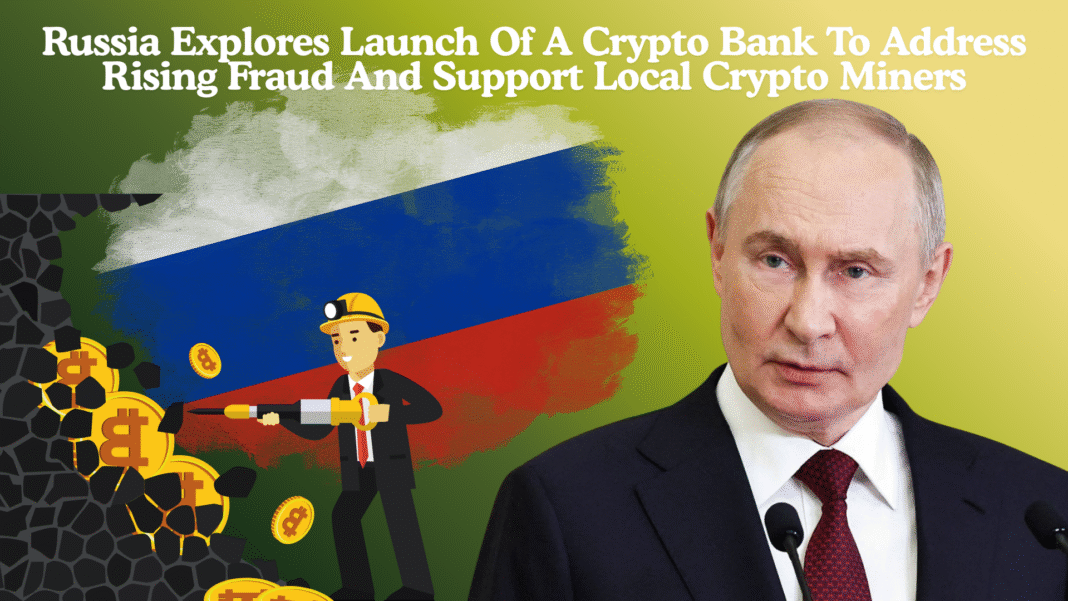Russia is considering the potential for a cryptocurrency bank, which would serve two primary functions: as a means of reducing fraud and aiding the growing number of crypto miners in Russia.
Evgeny Masharov brought the proposal forward as a member of the Russian Civic Chamber, which reviews projects and supervises legislative drafts.
In an interview cataloged by the Russian state news organization TASS, Masharov argued that the proposed crypto bank could follow in Belarus’s footsteps of developing a crypto exchange service through one of its major banks.
Evgeny Masharov noted that these types of entities could assist in moving the underground, or “shadow transactions,” into the lawful arena.
He also noted they could bring down the shadow and bring about transparency, leading to sources of additional revenue that could assist the federal budget.
Regulation and Sanctions Amid Crypto Growth In Russia
In 2022, it was reported that Russia banned cryptocurrency-based payments, but the geopolitical consequences following its invasion of Ukraine have prompted the country to rethink its position.
Now that Moscow is facing international sanctions, it is turning to the crypto sector to help establish trade and financial sustainability.
The government has already permitted financial institutions to offer crypto-based products to accredited investors, and earlier this year, it even floated a ruble-pegged stablecoin.
A crypto bank, according to Masharov, would be the next logical step in providing infrastructure to make transactions legitimate and reduce the need to unwittingly employ informal channels.
Also Read: Kyrgyzstan-Based A7A5 Stablecoin Tops $40B In Transactions As Russia Seeks SWIFT Alternative
Supporting the Crypto Mining Industry Amid Restrictions
One of the main hurdles encountered by Russian crypto miners is the lack of facilities to exchange mined digital assets into fiat currency.
Although Russia is still one of the biggest crypto mining centers in the world, it instituted a six-year mining prohibition in 10 of the 46 regions on January 1 to regulate energy usage, with a prohibition on mining in seasonal regions, considered areas of key mining activity.
The industry still appears to be vibrant despite the prohibitive actions. In June, Vyacheslav Kopylov of Prostomining stated that mining is a key focus at the Russian Blockchain Forum, as well as for more mining-related companies.
The establishment of a regulated crypto bank may provide profitable channels for miners to sell and spend their profits, making the industry sustainable.
Also Read: Unraveling a Massive Crypto Crime: 2 Russian Allegedly Laundered $530 Million Via Tether
Combating Fraud Through a Regulated Institution
Masharov highlighted that the crypto bank would also be an important instrument to counter financial crime, rather than just support miners.
Currently, a large part of the crypto transactions are conducted through informal exchangers where cash is directly credited to the wallets in exchange for a fee.
A government-backed bank would provide more oversight through requiring settlements in cryptocurrencies with enforcement that money would pass through a citizen’s good standing or official account.
This would limit the options for money laundering and criminal funding.
Masharov has previously called for the establishment of a government-controlled crypto fund to hold assets that have been taken through criminal asset forfeiture cases and thus indicated that regulation could actually improve the state’s regulatory power.
Growth Projections and Parallel Developments
Russia’s crypto market is developing at a swift pace, which should not be a substantial surprise given the regulatory uncertainty.
Revenue from the Russian crypto space is predicted to reach $2.3 billion in 2025 and $3.9 billion in 2026. More than 44 million Russians are expected to use crypto by then.
Meanwhile, Russian authorities continue to lean into banking and mining.
For instance, on July 11, 2023, Russian authorities announced that they would ban crypto mining in data centers powered by subsidized electricity as a means to counter suspected electricity misuse and increase costs for industrial-scale mining, UnoCrypto reported.
A week later, we reported that Russia’s largest bank, Sberbank, began pushing on its services in the area of crypto custody services, suggesting that crypto holdings could receive better security if treated similarly to deposits.
It also brought to market a bond based on Bitcoin prices and the ruble-dollar exchange rate, demonstrating how traditional finance is engaged with the new digital asset space.
Also Read: Russia Builds Crypto Mining Equipment Register To Stop Illegal Power Use


